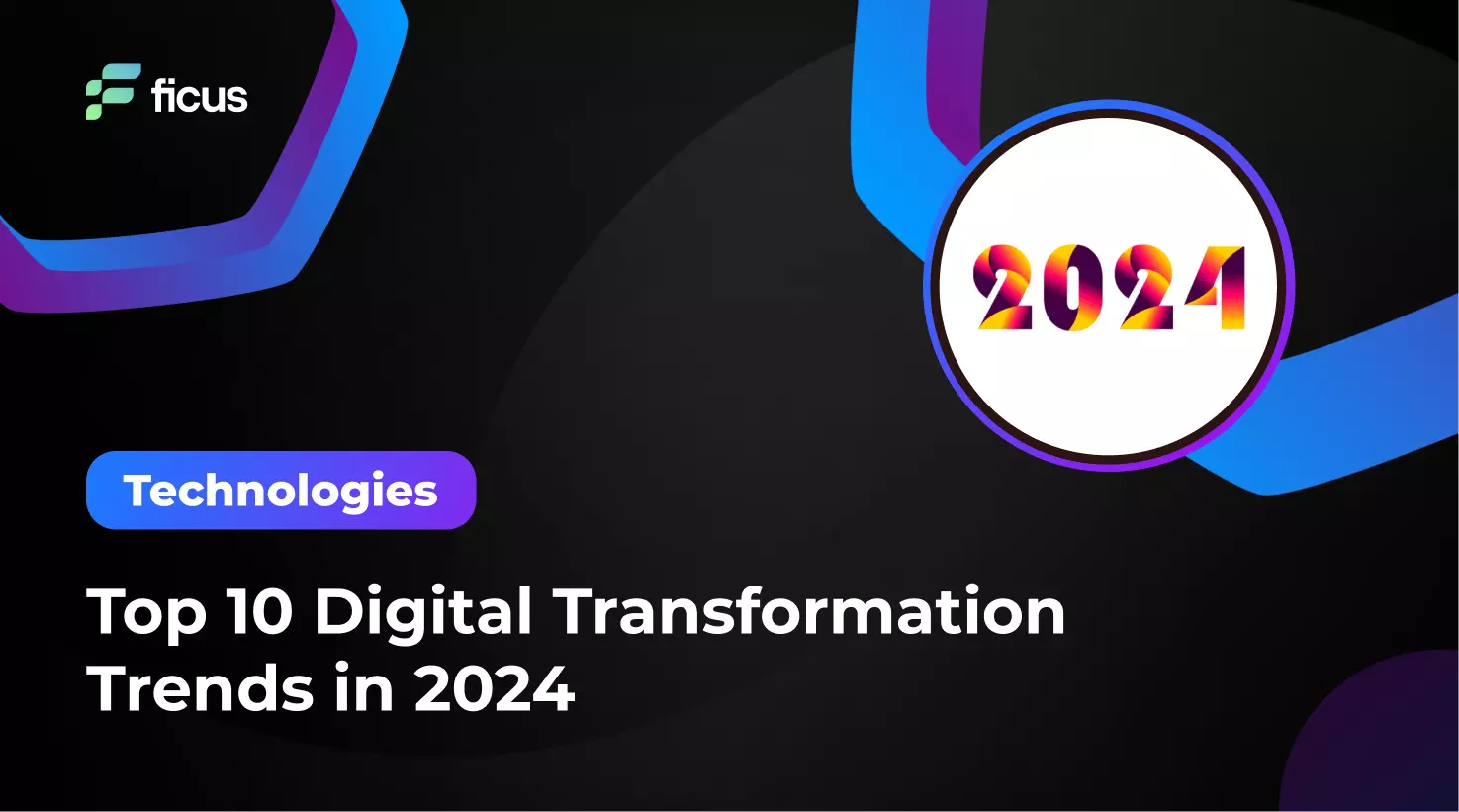Digital transformation is no longer just a trendy phrase but a key to success in a fast-paced, technologically advanced business environment. Failure to adapt and transform creates the risk of falling behind. This article reveals the significance of digital transformation trends and explains why they are more than just a trend. By delving into the most important components, from strategy to technology, we will help you develop an effective digital transformation strategy. By exploring the latest trends in digital transformation for 2024 and beyond, we ensure that you are ready for the future.
- The importance of digital transformation.
- Advantages of applying trends.
- Best trends in digital transformation.
Why is digital transformation important?
In a rapidly changing technological landscape, businesses undergo profound changes that are key to competitiveness. Recent years have seen a rapid transformation as companies adopt new technologies to optimize operations and increase profitability. Embracing digital transformation trends is becoming imperative to stay relevant and successful in the changing business environment.
- It’s a Modern Requirement
Thriving in today’s business environment requires close attention to digital transformation trends. Remaining competitive requires a rapid transition from traditional to modern practices. Organizations must develop tools and methods to meet the demands of the modern digital age. Implementing the latest technologies is not just a choice but a strategic necessity to succeed in a competitive environment. Adopting and adapting to the ever-changing digital transformation trends defines success in the modern business world, ensuring companies remain at the forefront of innovation and efficiency.
- Enhancing Client Satisfaction
Recognizing the transformative power of digital transformation trends is critical to improving customer satisfaction. Organizations are leveraging the latest digital transformation trends in our digital environment to optimize operations and efficiently deliver top-tier services. Successful companies that adapt to changing consumer preferences prioritize understanding and meeting customer needs. In an era of fierce market competition, those who can implement the latest digital transformation trends are gaining a competitive advantage. Using technologies such as cloud storage contributes to a deeper understanding of the audience, allowing companies to tailor products and services to customer preferences.
- It Facilitates Team Collaboration
Recognizing the impact of digital transformation trends on team dynamics is crucial. Service providers in the digital transformation are improving internal collaboration and fostering external relationships. Artificial intelligence is becoming a powerful tool that enables effective communication and teamwork, regardless of the business model or size of the company.
Companies that use digital solutions simplify team coordination, ensuring the timely completion of tasks. This increases team productivity and optimizes cooperation and communication between team members. The evolving digital transformation trends highlight the pivotal role of technology in optimizing teamwork and cultivating a collaborative work environment.

Benefits of Digital Transformation
Digital transformation, despite its complexity, offers irreplaceable benefits that are critical to the success of modern businesses. Navigating this multi-faceted journey can be challenging, and support is needed. Understanding the importance of digital transformation trends is crucial. The continuing evolution of trends in digital transformation emphasizes its transformative impact on operations. From increasing customer satisfaction through personalized service to creating new revenue streams through software monetization, digital transformation is a strategic necessity. Utilizing the latest trends in digital transformation ensures that businesses thrive in a dynamic and competitive digital environment.
- Increases Customer Satisfaction
Meeting the growing expectations of customers requires personalized services and process automation. The demand for seamless automated interaction without human intervention shapes the modern customer experience. Using the opportunities of digital transformation trends, companies are implementing reliable tools and strategies that allow them to modify licenses according to location or industry specifics and automate processes. A clear benefit of digitalization is its ability to streamline operations, making tasks such as accessing software, updating it, or deactivating and reactivating it easy. These digital processes are a direct path to increased customer satisfaction, which meets the growing needs of today’s clientele.
- Drives Data-Based Insights
A key benefit of digital transformation trends is the ability to collect and analyze data, turning it into actionable, revenue-generating insights. In the past, data was scattered across disparate platforms or, worse, not collected at all. Digital transformation facilitates reliable data collection, centralized storage, and the creation of tools to analyze and transform data into information that supports informed corporate decision-making. This change in approach, which aligns with the latest trends in digital transformation, allows companies to utilize the full potential of data, turning it into a strategic asset to drive innovation and growth.
Clearly, the thing that’s transforming is not the technology — it’s the technology that is transforming you.
Jeanne W. Ross
- Enables Software Monetization
Recognizing the need to shift from a product-centric approach to a software-centric approach, businesses realize that embracing digital transformation trends is critical to generating optimal profits. Software monetization is the cornerstone to achieving the best ROI in today’s business environment. However, many companies are stuck at the launch pad, not knowing how to get the software monetization engine running. Leveraging digital transformation provides the necessary impetus for this transition. Using a software management solution like Sentinel creates a solid digital foundation that allows companies to open up new revenue streams, create and protect software licenses, interact effectively with customers, and access critical business data.
- Limits Human Error
A compelling benefit of digital transformation is its inherent ability to reduce errors. Digital processes eliminate time-consuming manual data entry and reduce human inefficiency, providing a smoother and less risky alternative to manual procedures that can lead to errors. The continuing evolution of digital transformation trends emphasizes technology’s crucial role in minimizing the impact of human error. By adapting to the latest trends in digital transformation, companies are protecting their operational processes from potential pitfalls, ensuring greater efficiency and reduced risk in the ever-changing digital landscape.
- Increases Operational Efficiency
Digital transformation is a catalyst for significant improvements in operational efficiency. It consolidates cumbersome manual processes, reducing overhead costs through seamless integration with back-office systems. Automation of shipping, product updates, and cross-device activation further streamlines operations. Managing multiple product variants becomes more efficient. Adopting these digital transformation trends can save time, close revenue gaps, and reduce frustration. In a dynamic business environment, going digital is synonymous with creating an environment of efficiency and adaptability that aligns with the latest trends in digital transformation.
Looking to improve your digital transformation?
Contact UsTop 10 digital transformation trends
Blockchain
Blockchain technology is one of the key enablers of digital transformation trends, offering unprecedented benefits in terms of trust, transparency, and traceability. As businesses move to a more secure digital environment, blockchain adoption is becoming a common strategy, especially in industries where data security is a priority. This trend manifests in two key strategies: developing and integrating blockchain applications into existing technologies. The exponential growth of investments from $2.7 billion in 2019 to approximately $19 billion in 2024, as reported by Tech. Co underscores the undeniable importance of blockchain as one of the latest trends in digital transformation. Keeping a close eye on this trend is crucial for businesses navigating the dynamic digital environment.
IoT and 5G
5G, the fifth generation of mobile communications technology, offers transformational capabilities, including multi-peak data speeds, minimal latency, improved user experience, connectivity, accessibility, and increased network capacity. This evolution is a cornerstone in the landscape of digital transformation trends that are driving technological advancements. The synergies between IoT and 5G are opening avenues for significant progress. Collaborations, such as IBM providing cloud services to Verizon and Telefonica for 5G networks, are examples of the potential. Automation based on technologies such as artificial intelligence (AI), drone-initiated inspections, and video inspections is becoming a key outcome, preventing network problems and shaping the latest trends in digital transformation.
Generative AI
Artificial intelligence has proven valuable in various business areas, but its full potential remains unexplored. Companies undergoing digital transformation trends are increasingly utilizing generative AI, looking for innovative ways to take advantage of its benefits. Thanks to recent advancements, including well-known players such as ChatGPT, Dall-E2, Scribe, and Bard, the market is experiencing a paradigm shift. These generative AI solutions are redefining marketing, sales, and customer support approaches. This trend is expected to intensify in 2024, and therefore, businesses must take an important step: integrate various AI-based systems into a single platform. As organizations evolve their AI tools, investing in intelligent data integration becomes imperative to take full advantage of generative AI in the face of dynamic new trends in digital transformation.
Low-code, no-code platforms
Amidst the digital transformation trends, low-code and no-code platforms are changing the game. These innovative solutions enable people with limited coding experience to develop applications, speeding up the development process. The latest trends in digital transformation emphasize the efficiency and accessibility of these platforms. By enabling rapid application development, they reduce the dependence on traditional coding, promoting flexibility and adaptability. As businesses navigate a dynamic digital environment, using low-code and no-code platforms is becoming synonymous with staying abreast of the latest trends in digital transformation to optimize and improve the efficiency of development processes.
Hyperautomation
Amidst the ever-changing landscape of digital transformation trends, hyper-automation is becoming a transformative force. This latest digital transformation trend combines advanced technologies such as artificial intelligence, machine learning, and robotic process automation to streamline and improve business processes. Hyper-automation goes beyond traditional automation to promote end-to-end process automation. Organizations that embrace this trend are gaining unprecedented efficiency gains, improved decision-making, and a competitive advantage in the digital age. As companies navigate the complexities of the latest digital transformation trends, hyper-automation is a catalyst for comprehensive and efficient process optimization.
Multi-cloud Utilization
Given the digital transformation trends, the prevalence of multi-cloud environments in enterprises is undeniable. Working in multiple clouds creates certain challenges, especially when moving workloads. API and container-based development are ideal solutions to solve this problem. APIs open up unique functionality for applications in multi-cloud environments, facilitating seamless operation. Containerization is also proving to be effective in addressing the challenges associated with multi-cloud environments. Implementing multi-cloud strategies is a key step on the road to managed services for digital transformation. By leveraging the latest digital transformation trends, companies optimize results by effectively navigating the complexities of multi-cloud environments.
Data-driven Business
Becoming a data-driven business is not just a choice but a strategic imperative in a world of ever-changing digital transformation trends. The latest trends in digital transformation emphasize the key role of using data to make informed decisions and drive sustainable growth. Embracing this trend means collecting data and harnessing its power to drive strategic initiatives. Organizations that prioritize the use of data gain unprecedented insights, improve operational efficiency, and gain a competitive advantage. In the era of the latest digital transformation trends, companies that recognize and harness the potential of data are becoming leaders in the evolving digital landscape.
Connected User Experience
The demand for a Connected User Experience is taking center stage in the ever-expanding spectrum of digital transformation trends. As the average number of applications in use in organizations increases, consumer expectations for seamless consistency across channels such as messaging and mobile service portals are rising. As companies provide digital transformation advisory services, providing an end-to-end experience becomes imperative. Omnichannel customers who benefit from better connectivity demonstrate longer online interactions than single-channel customers. This entails providing an improved and accessible experience for customers anywhere and anytime. Surveys show that despite the average enterprise using 900 apps, only 29% of them can deliver a truly interconnected experience, highlighting the changing landscape of recent trends in digital transformation.
Privacy and Trust
With digital transformation trends, the critical pillars of privacy and trust are becoming crucial to organizational progress. A global survey of over 4,000 brands and consumers revealed a stark reality: 61% of brands admitted losing consumer trust due to inadequate data protection. This growing trust deficit requires increased attention to consumer and brand relationships to ensure sustainable progress. As data regulation gathers momentum, future success depends on ensuring the transparency of consumer data and delivering an optimal user experience. In the dynamic and ever-changing realm of the latest digital transformation trends, prioritizing privacy and trust is a prerequisite for building strong brand-consumer relationships.
Partner Ecosystem
Developing an ecosystem of strategic partners is paramount to business expansion in a world of digital transformation trends. Successful organizations are at the forefront of building collective ecosystems, bringing together external partners, stakeholders, and customers. This dynamic partner ecosystem plays a key role in the seamless integration of products and services into the customer experience, reflecting a proactive stance in adapting to the latest trends in digital transformation. Engaging in strategic partnerships is not just a choice but a strategic imperative for organizations seeking to thrive in the changing and competitive environment of digital transformation.
Final Thoughts
In conclusion, the ever-changing digital transformation trends are shaping the future of business in 2024 and beyond. It is no longer just a buzzword but a critical aspect determining success in today’s dynamic environment. From the mandatory transition to modern practices to the key role of technology in increasing customer satisfaction and operational efficiency, staying up to date with the latest digital transformation trends is non-negotiable. This journey involves leveraging generative artificial intelligence, navigating the complexities of multi-cloud environments, fostering user engagement, and prioritizing privacy and trust.
At Ficus Technologies, we understand how important it is to stay ahead of the curve on digital transformation trends. Our expertise lies in providing end-to-end solutions that are up to date with the latest developments, enabling companies to integrate transformational technologies seamlessly. Whether leveraging generative artificial intelligence, optimizing multi-cloud technologies, improving user experience, or ensuring privacy and trust, Ficus Technologies is your strategic partner in navigating the complex landscape of digital transformation trends.
Measuring ROI on digital transformation involves a comprehensive evaluation of financial gains, operational efficiencies, and customer impact. Assess increased revenue, cost savings, and productivity enhancements against the initial investment. Quantify improvements in customer satisfaction, employee engagement, and innovation. Consider factors like reduced time-to-market, enhanced data analytics, and streamlined processes. Track key performance indicators (KPIs) aligned with digital transformation goals, including technology adoption rates and successful project implementations. Regularly review and adjust the measurement criteria to ensure ongoing alignment with strategic objectives. A holistic approach to ROI measurement captures the multifaceted benefits of digital transformation across the organization.
Mobile technology is pivotal in digital transformation by fostering agility, connectivity, and accessibility. It enables seamless collaboration, allowing employees to work anytime, anywhere, enhancing productivity and flexibility. Mobile apps streamline processes, improving operational efficiency and customer interactions. With real-time data access, decision-making becomes more informed and responsive. Mobile devices facilitate IoT integration, supporting data-driven insights. Moreover, mobile tech enhances customer experiences through personalized services and instant interactions. By embracing mobile capabilities, businesses optimize workflows, accelerate innovation, and adapt to evolving market demands, thereby driving the broader digital transformation agenda toward a more connected and dynamic future.








